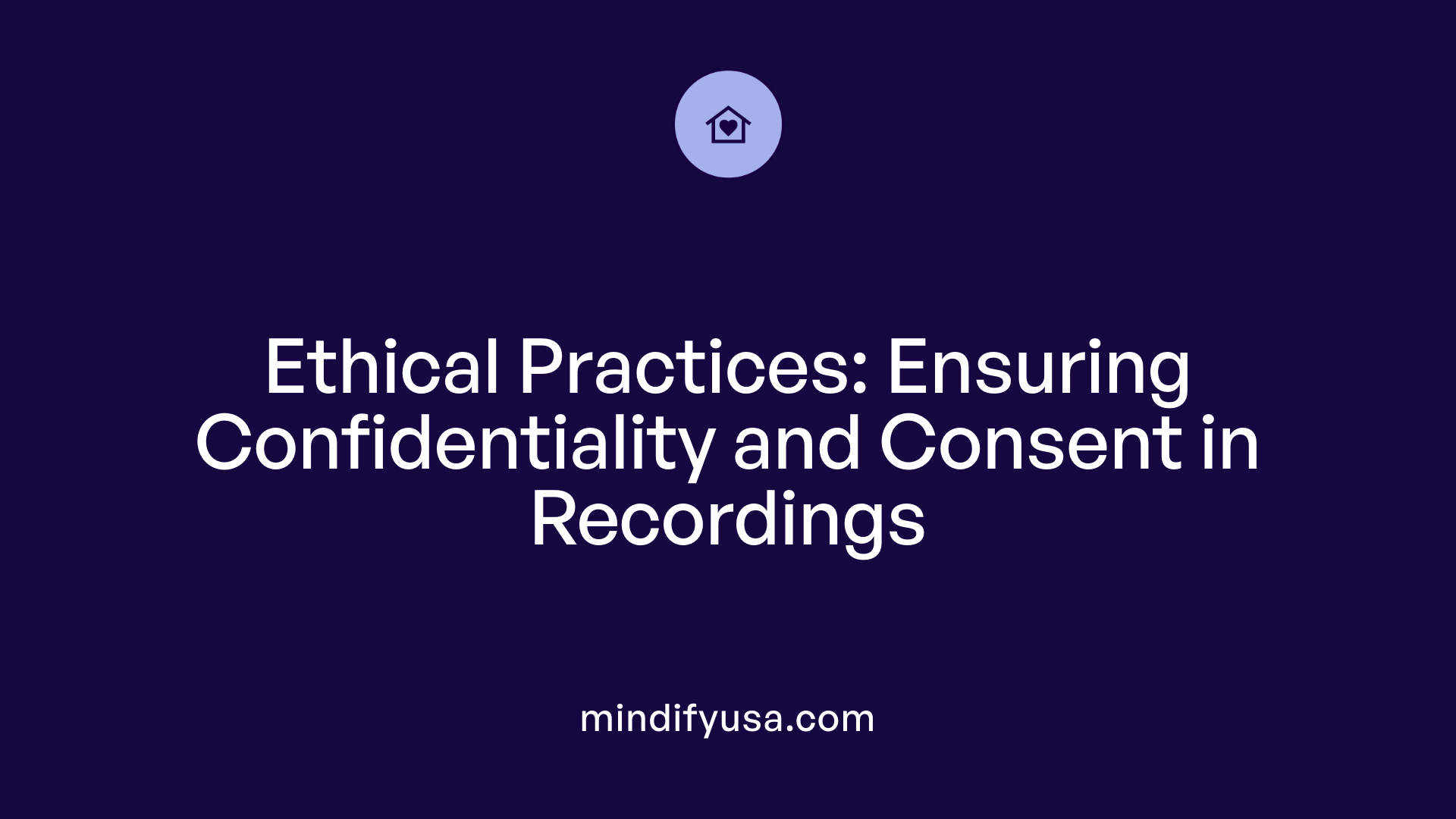The Role of Recording in Group Therapy Settings
Group therapy has become an essential modality in mental health treatment, offering clinicians an effective way to treat multiple clients simultaneously. As technology becomes more integrated into practice, questions about recording these sessions—and the implications thereof—have gained prominence. This article explores whether group therapy sessions are typically recorded, the practices involved, and the ethical, legal, and confidentiality considerations that accompany such recordings.
Common Practices for Recording Group Therapy Sessions

Are group therapy sessions typically recorded, and what are the common practices for recording them?
Recording group therapy sessions is not a standard or universal practice. It largely depends on the setting, legal requirements, ethical guidelines, and the goals of therapy. Unlike individual therapy, where sessions might sometimes be recorded for personal reflection or progress tracking, group therapy recordings are approached with more caution due to the increased risk of breaching confidentiality.
When clinicians decide to record group sessions, they generally obtain explicit informed consent from all participants beforehand. This consent process involves informing clients about the purpose of recording, how recordings will be stored, who will have access, and the potential confidentiality risks. Especially in telehealth environments, where sessions are conducted online, the importance of secure, encrypted platforms becomes a priority.
Recordings in group therapy are often used sparingly, primarily for supervision, training, or review purposes. Strict protocols are put in place to protect client privacy, such as encrypting files, keeping access limited to authorized personnel, and securely storing recordings in compliance with HIPAA and organizational policies.
Informed participants are made aware of the risks involved in recording, including the possibility that other group members might share or disclose recorded material. It’s important to emphasize to clients that confidentiality is more complex in group settings, as information revealed in sessions could become accessible to all present participants.
Practices surrounding recordings also include guidelines for managing this sensitive process: ensuring recordings are made lawfully under state law (for example, one-party or two-party consent rules), and confirming that all clients are comfortable with the early understanding that nothing will be recorded without clear prior agreement. Clinicians carefully document these consents in client records.
Overall, the decision to record is taken cautiously, respecting privacy laws and ethical standards. When recordings are used, they serve as a supplement for supervision or educational purposes, not as a routine element of therapy in the group context. The focus remains on maintaining confidentiality while enhancing therapeutic effectiveness through secure, responsible handling of any recorded content.
Legal and Ethical Considerations in Recording
What are the key confidentiality, privacy, and legal considerations when recording group therapy sessions?
Recording group therapy sessions involves several crucial confidentiality and legal requirements. Protecting participants' privacy starts with transparent communication about what can and cannot be recorded, and this must be clearly documented in informed consent agreements.
Legal obligations like HIPAA (Health Insurance Portability and Accountability Act) in the United States set strict standards for safeguarding protected health information (PHI). Recordings must be securely stored using encryption and restricted to authorized personnel only, whether in digital or physical formats.
In group therapy, establishing and maintaining norms around confidentiality is vital. All participants should understand that the setting involves shared information and that unauthorized recording or sharing of session content is prohibited. Therapists should also educate clients about the limits of confidentiality, especially in telehealth or online sessions, where risks of digital breaches exist.
Legal scenarios such as mandatory reporting of abuse or threats to safety might require breaching confidentiality, which should be outlined beforehand. Additionally, local laws vary; for instance, Tennessee is a one-party consent state, meaning any participant can record the session legally.
Practitioners must stay updated on evolving legal and ethical standards, including those from professional bodies like the APA, to ensure compliance. When recordings are permitted, they should serve therapeutic purposes, like reflection or progress tracking, and not be shared outside the treatment context without explicit consent.
Overall, establishing clear policies, using HIPAA-compliant platforms, and regularly revisiting confidentiality agreements are essential steps for ethically and legally sound group therapy recordings.
Ethical Standards for Recording in Group Therapy

What are the ethical standards and guidelines regarding recording group therapy sessions?
Recording group therapy sessions involves specific ethical responsibilities that clinicians must adhere to. Foremost, obtaining informed consent from all participants is essential before any recording takes place. This process ensures that members fully understand how the recordings will be used, stored, and protected, allowing them to make knowledgeable decisions about their participation.
Therapists are responsible for maintaining the confidentiality and security of recorded material. Legal standards such as HIPAA and various state laws, like California’s two-party consent law or Tennessee’s one-party consent regulation, set the framework for how recordings must be handled. For instance, clinicians must inform clients about their rights and the potential risks of recording, including confidentiality breaches.
Accurate documentation of recording protocols is necessary. This includes noting the consent process, storage locations, and intended purposes, whether for supervision, training, or future reference. Recordings should be securely stored using HIPAA-compliant platforms, with access restricted to authorized personnel only.
Furthermore, recordings should be retained only as long as needed and destroyed securely thereafter, unless specific legal or clinical reasons dictate otherwise. When sharing recordings—such as for supervision or consultation—explicit consent must be reaffirmed, and secure transfer methods should be employed.
In telehealth contexts, additional precautions are advised, like notifying participants about the potential for recording in digital settings and using encrypted platforms. Therapists should also inform clients of the limits of confidentiality inherent in group and virtual settings.
Overall, balancing ethical responsibilities involves respecting client autonomy, protecting their privacy, and complying with applicable laws. Transparent communication, secure handling of recordings, and clear policies form the foundation for ethical recording practices in group therapy.
| Aspect | Guideline | Details and Rationale |
|---|---|---|
| Informed Consent | Must be obtained prior to recording | Ensures clients understand recording purpose and risks |
| Confidentiality | Recordings must be securely stored and access limited | Protects client privacy and complies with legal standards |
| Legal Compliance | Follow HIPAA, state laws (e.g., California, Tennessee) | Legal obligation to protect and handle recordings properly |
| Documentation | Keep detailed records of consent, storage, and usage | Maintains transparency and accountability |
| Usage of Recordings | For supervision, education, or client review with consent | Clear purpose minimizes misuse |
| Storage and Security | Use encrypted, secure platforms | Prevents unauthorized access |
| Destroy or Retain | Retain only as long as necessary; destroy securely when no longer needed | Limits unnecessary exposure and liability |
| Participant Rights | Inform clients they can revoke consent and clarify recording policies | Respecting autonomy and promoting trust |
| Telehealth Specifics | Use HIPAA-compliant telehealth platforms; inform about recording policies | Addresses digital security concerns |
| Handling Unauthorized Recordings | Have policies in place to respond if recordings are made without consent | Protects client rights and minimizes breaches |
Adherence to these guidelines ensures ethical integrity in the management of recordings during group therapy, fostering trust and upholding professional standards.
Impact of Recording on Client Trust

How does recording impact client confidentiality and trust in group therapy?
Recording in group therapy has a significant influence on client confidentiality and the trust they place in their therapist and the therapeutic process. When recordings are used appropriately—with informed consent and clear boundaries—clients may feel reassured that their privacy is respected. Proper management involves secure storage of recordings, limited access to authorized personnel, and a thorough explanation of what is being recorded, why, and how the recordings will be used.
However, if recordings are made without explicit consent or are mishandled, they can create feelings of betrayal and diminish trust. Clients might worry about their private disclosures being shared beyond the session, even unintentionally, which can hinder open communication and honesty. Unauthorized recordings or those stored insecurely increase the risk of breaches, leading to emotional distress and skepticism toward the therapist's ethical standards.
To maintain trust, clinicians should emphasize transparency about recording policies from the outset, including explaining that recordings are generally not standard practice unless mutually agreed upon. Clinicians should also ensure that any recordings, if permitted, are used solely for therapeutic purposes, stored securely, and destroyed when no longer needed. This approach aligns with legal obligations such as HIPAA and ethical standards outlined by professional organizations.
In addition, using secure, encrypted platforms for telehealth sessions—especially when recordings are involved—is critical. Clients should be educated about potential risks, such as recordings being captured or shared without consent, and be encouraged to use anonymized identifiers if recording for personal review. Such measures help reinforce a sense of safety and respect for confidentiality.
Ultimately, the way recordings are approached directly impacts the therapeutic alliance. Respecting client privacy and handling recordings with utmost caution fosters an environment of trust and safety, encouraging honest participation and the effectiveness of group therapy. Ensuring that all sessions are documented ethically and legally reinforces confidence in the therapeutic relationship and promotes ongoing engagement.
Guidelines and Policies for Telehealth Group Recordings

Are there guidelines or policies for recording sessions in telehealth group therapy?
Yes, there are specific guidelines and policies regarding recording sessions in telehealth group therapy. These protocols are essential to uphold confidentiality, ethical standards, and legal compliance.
Practitioners should start by obtaining informed consent from all group members before recording any session. This consent process involves clearly explaining the purpose of recording, how recordings will be used, stored, and protected, as well as discussing potential risks, such as privacy breaches or accidental disclosures.
It is critical to inform clients about the limits of confidentiality, especially in a group setting where multiple individuals are sharing sensitive information. Participants should understand that recordings may include content shared by others, which could be accessible to all present members if recorded or shared unlawfully.
The use of HIPAA-compliant platforms is strongly recommended to ensure that recordings are secure. These platforms provide encryption and secure storage options that protect client data. During sessions, therapists should establish clear rules, such as prohibiting recording or taking screenshots unless explicitly agreed upon, to prevent unauthorized sharing.
Procedures must be put in place for securely storing recordings, with access limited to authorized personnel. This includes maintaining encrypted backups and defining retention periods in accordance with regulations and organizational policies.
Legal considerations vary by jurisdiction. For example, in some states, recording without the consent of all parties—known as two-party or multi-party consent—may be illegal. Therapists must be familiar with and adhere to local laws to avoid legal repercussions.
Documentation of consent and policies should be incorporated into clients’ records. Proper records help demonstrate compliance and provide legal protection should disputes arise.
Organizations typically develop comprehensive Standard Operating Procedures (SOPs) that cover all aspects of recording in telehealth group therapy, including client consent, technical security measures, staff training, and breach management.
In summary, effective recording policies in telehealth group therapy encompass informed consent, secure technology use, strict confidentiality protocols, clear communication about risks, and adherence to legal standards. These measures create a safe environment for clients and facilitate ethical practice.
Managing and Documenting Recorded Sessions

How should recorded group therapy sessions be documented and managed?
Recording group therapy sessions poses unique privacy and legal considerations. These sessions should be securely stored using HIPAA-compliant platforms that support encryption, password protection, and session-specific tokens. Access to these recordings should be limited exclusively to authorized personnel, usually the therapist and, where appropriate, the supervising staff. This helps ensure confidentiality, aligns with legal standards, and prevents unauthorized disclosures.
In addition to safeguarding recordings, detailed documentation of each session is essential. For every group session, clinicians should prepare individual notes for each member, addressing aspects such as diagnosis, mental status, interventions used, responses observed, participation levels, and progress toward treatment goals. It's important that these notes avoid revealing identifiable information about other group members to protect their privacy.
Structured note formats like SOAP (Subjective, Objective, Assessment, Plan), GIRP (Goals, Intervention, Response, Plan), or DAP (Data, Assessment, Plan) can facilitate organized, comprehensive, and standardized documentation efforts. These templates help clinicians systematically record critical clinical details, making notes easier to review and ensuring consistency across sessions.
Tools such as TheraPlatform and other practice management software offer features like electronic signatures, secure storage, and customizable note templates. Such tools streamline the recording and documentation process, improve legal compliance, and support efficient record-keeping.
Session documentation should thoroughly detail the session’s purpose, group topic, activities conducted, participant engagement, and how interventions are aiding in achieving the treatment plan and functional goals. Recording behaviors, interactions, and reactions provides valuable information for tracking client progress and tailoring future sessions.
Maintaining personalized, detailed, and compliant records not only fulfills legal and ethical obligations but also enhances ongoing treatment effectiveness. Proper management of recordings and meticulous note-taking safeguard client confidentiality and foster a trustworthy therapeutic environment.
Additional considerations
- It is advisable to avoid recording sessions unless mutually agreed upon, and any recording should be explicitly consented to by all participants.
- When recordings are used for personal reflection or skill development, clear policies and informed consent are essential.
- Recordings should be used and stored in accordance with local laws, such as California’s two-party consent rule or Tennessee’s one-party consent law.
- When conducting group therapy via telehealth, confidentiality concerns are heightened. Therapists must ensure the platform used is secure, sessions are private, and participants understand the confidentiality limits.
| Aspect | Description | Additional Notes |
|---|---|---|
| Storage | Use HIPAA-compliant, encrypted platforms | Secure access restricted to authorized personnel |
| Individual notes | Document diagnosis, responses, and progress | Avoid revealing identities of other group members |
| Note formats | Use SOAP, GIRP, or DAP | Streamlines documentation |
| Tools | Practice management software | Includes electronic signatures and customizable templates |
| Session detail | Record purpose, activities, engagement, goals | Supports ongoing treatment and legal compliance |
| Recordings | Obtain client consent before recording | Use for reflection, not routine unless agreed |
| Legal compliance | Follow state laws (e.g., two-party vs. one-party consent) | Important for lawful recording practices |
Through conscientious management and detailed documentation, therapists can uphold confidentiality, meet legal requirements, and provide high-quality, effective group treatment.
Rules and Ground Rules for Conducting Group Therapy

What are common rules or ground rules for conducting group therapy sessions?
Establishing clear guidelines at the outset is crucial for effective and ethical group therapy. Common ground rules focus on maintaining confidentiality, respect, and safety within the group. Participants are expected to keep what is shared in the session strictly private to protect trust and privacy, unless safety concerns necessitate disclosure. Respectful and empathetic listening is fostered to promote a supportive and non-judgmental atmosphere. Punctuality, consistent attendance, and responsible behavior are emphasized to ensure the group functions smoothly.
Specific behaviors such as gossip, offensive language, intimidation, or any form of violence are strictly prohibited. The therapist introduces these rules during initial meetings and periodically reviews them to reinforce their importance.
Participants are encouraged to share their experiences honestly, respecting others’ boundaries and perspectives. Guidelines may also include rules about outside relationships, substance use, and the use of electronic devices, all aimed at creating a safe, focused, and collaborative environment.
In addition, group members should understand and adhere to policies regarding recording sessions or sharing session content externally. This helps preserve confidentiality, especially in a setting where multiple individuals' disclosures are involved.
To summarize, effective group therapy relies on a foundation of mutual respect, clear expectations, and consistent enforcement of rules designed to protect both client wellbeing and therapeutic integrity. These rules are continually reinforced to create a secure space where healing and growth can occur.
Clients' Rights and Legal Remedies for Unauthorized Recordings

What are clients' rights and legal recourses if they are recorded in group therapy without their consent?
In group therapy settings, clients have a fundamental right to informed consent regarding recordings. This means therapists are ethically and legally obligated to inform participants if sessions might be recorded, whether for personal reflection, training, or documentation purposes. Participants should be given clear information about policies, including whether recordings are permitted, stored securely, or shared.
Recording sessions without consent can violate privacy protections under laws such as HIPAA, which emphasize confidentiality and security of health information. Unauthorized recordings, especially if shared or disseminated without permission, may lead to legal action for invasion of privacy. Clients can pursue remedies such as filing complaints with licensing or regulatory boards, requesting damages, or initiating lawsuits for breach of confidentiality.
Legal recourse depends on jurisdiction. For instance, Tennessee is a one-party consent state, which permits any participant to record a conversation, including group sessions. However, even in such states, recording and especially sharing or distributing recordings may breach ethical standards and can result in criminal or civil penalties.
To mitigate risks, therapists should establish and communicate clear policies about recordings in advance. Confidentiality agreements, informed consent forms, and explicit policies help protect both clients and practitioners. When recordings are made without prior consent, clients are advised to seek legal counsel to evaluate their options. These may include filing complaints with professional bodies or pursuing legal action for invasion of privacy or breach of confidentiality.
It is crucial for therapists to stay updated on state-specific laws and professional guidelines. For example, under HIPAA, all protected health information, including recordings, must be securely stored, and sharing without consent may be considered a violation.
In summary, clients' rights include being informed about recording practices and having control over whether sessions are recorded. If recordings occur without consent, clients have several legal avenues to seek remedy, emphasizing the importance of transparent practices and strict adherence to legal and ethical standards to maintain trust and protect patient confidentiality.
Balancing Confidentiality, Ethics, and Practicality
In summary, while recording group therapy sessions can serve beneficial purposes such as review and training, it poses complex ethical, legal, and confidentiality challenges. Best practices involve clear informed consent, secure storage, adherence to legal standards like HIPAA, and continuous education about evolving guidelines. Practitioners must weigh the benefits of recordings against the importance of maintaining trust and confidentiality, especially in sensitive group settings. Ultimately, transparent policies and vigilant management are essential to uphold the integrity of the therapeutic process while respecting clients’ rights and fostering a safe, respectful environment.
References
- Documenting Group Therapy - Documentation Wizard, LLC
- Couples and Group Therapy Confidentiality - Office of the Professions
- How to do group therapy using telehealth - APA Services, Inc.
- Group therapy notes - TheraPlatform
- Is It OK To Record Your Therapy Sessions? | HuffPost Life
- How to Run a Successful Group Therapy Session - Valant
- Group Therapy - StatPearls - NCBI Bookshelf
- How group therapy sessions can help your practice - Healthie
- Can a client record a therapy session - Telehealth.org






































































































